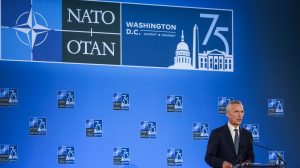Catch up quickly with the stories from Central and Eastern Europe that matter, this week led by a long-awaited change at the top in Ukraine’s armed forces.
Russia’s war on Ukraine
Ukraine’s president this week sacked the commander-in-chief of the country’s armed forces, Valerii Zaluzhnyi.
It follows speculation about a rift between the president and General Zaluzhnyi, who has led Ukraine’s war effort since the conflict began. Battle-hardened General Oleksandr Syrskyi was announced as his replacement in a presidential decree.
It is the biggest change to Ukraine’s military leadership since Russia’s full-scale invasion in February 2022.
President Volodymyr Zelensky said the high command needed to be “renewed” and that Gen Zaluzhnyi could “remain on the team”.
“Starting today, a new management team will take over the leadership of the Armed Forces of Ukraine,” he said on Thursday.
The US Senate on Thursday advanced an aid package for Ukraine and Israel a day after Republicans blocked a larger bipartisan border security and foreign aid bill.
Pushing through an initial hurdle, lawmakers voted 67-32 to consider the 95 billion US dollars aid package. Democrats are in favour of passing the aid, but Republicans remain divided.
Earlier on Thursday, Polish Prime Minister Donald Tusk had told Republican senators that they should be “ashamed” for leaving Ukraine in limbo.
“Dear Republican Senators of America. Ronald Reagan, who helped millions of us to win back our freedom and independence, must be turning in his grave today. Shame on you,” Tusk wrote on X, formerly called Twitter.
By invoking Reagan, a former Republican president, and his efforts in the 1980s to support Poland’s struggle to shake off Moscow’s dominance, Tusk sought to underscore Washington’s global role and previous Republican values.
Tighter army mobilisation rules targeting would-be Ukrainian soldiers and proposing asset freezes for those who are trying to dodge the draft came a step closer on Wednesday when parliament passed the first reading of the bill.
As the number of volunteer soldiers falls, the bill proposes requiring potential military personnel who are abroad to have up-to-date military registration.
Obtaining such a document would be a prerequisite to receiving consular services.It also proposes tighter sanctions for draft evasion, including an asset freeze, and envisages online call-ups, something that would make it harder to avoid being conscripted.If the law is passed at the next stage in parliament, it will lower the age at which people can be mobilised for combat duty to 25 from 27.
Those who have served continuously for 36 months during the war may be discharged, but this will not happen automatically.
Ukraine this week announced that it had added a branch to its armed forces dedicated to drones, a sign of the growing importance of uncrewed aerial vehicles to modern warfare.
Zelensky announced the creation of the Unmanned Systems Forces in a video message on Tuesday. He said the new branch would improve coordination, planning and logistics as the country continues its war with Russia.
“Drones—unmanned systems—have proven their effectiveness in battles on land, in the sky and at sea. Ukraine has truly changed the security situation in the Black Sea with the help of drones,” Zelensky said.
Zelensky added that, for Ukraine, drones are especially important for repelling ground assaults and destroying occupying forces and their equipment. He said the new centralised drone branch will focus on effective training, increasing production and deploying specialised units.
Other news from the region
President Ilham Aliyev of Azerbaijan secured a fifth consecutive term in a presidential election on Wednesday, winning 92 per cent of the vote. “The Azerbaijani people have elected Ilham Aliyev as the country’s president,” Central Election Commission chief Mazahir Panahov told a press conference. Turnout in the snap election, which was called a year early following Azerbaijan’s recapture of the Nagorno-Karabakh region from Armenian separatists last September, was 67.7 per cent. Azerbaijan’s main opposition parties boycotted the vote, calling it an “imitation of democracy”.
The former chairman of Georgia’s ruling party was appointed by parliament as prime minister of the Caucasus nation on Thursday in a reshuffle ahead of national elections in the autumn. Irakli Kobakhidze was named to the job by a 84-10 parliament vote. He previously stepped down as chairman of the ruling Georgian Dream party and was replaced by the former prime minister, Irakli Garibashvili, who resigned last month. The reshuffle came after Georgian Dream’s founder, billionaire Bidzina Ivanishvili, returned as the party’s honorary chairman.
Kazakhstan also got a new PM this week, when President Kassym-Jomart Tokayev appointed his chief of staff Olzhas Bektenov to the post following the resignation of the previous cabinet. Bektenov, 43, led the country’s anti-corruption agency before he was named head of the presidential administration in April last year. Before that, he had worked in the anti-corruption agency in various positions since 2018. The new government is likely to continue efforts to boost business activity, aided by increased budget spending, a decrease in inflation last year and accelerating economic growth.
The European Commission on Wednesday launched legal action against a so-called ‘sovereignty law’ recently passed by the Hungarian parliament. The legislation, spearheaded by Viktor Orbán’s ruling party and approved by the parliament in mid-December, empowers the state to investigate people and organisations suspected of undermining the country’s sovereignty, with potential convictions of up to three years in prison. Orbán, who frequently lambastes his critics as agents paid for by Western entities, says the law is necessary to protect Hungary from undue political interference.
The Czech government will evaluate the merits of joining the ERM II exchange rate mechanism, a currency flotation band that aspiring countries must spend two years in before joining the euro zone, ruling parties’ leaders agreed late on Tuesday. Leaders of the centre-right Czech ruling coalition agreed to seek expert panel advice by October on the possibility of joining the so-called “euro waiting room”, after pressure from pro-euro parties in the coalition. Obliged to adopt the euro when it meets a set of criteria, Czechia has until now been reluctant to move towards membership of the single currency.
Members of the opposition in the Serbian parliament on Tuesday walked out of the assembly’s opening session after refusing to be sworn in together with the majority Serbian Progressive party (SNS), which they accuse of stealing the election. Members of the Serbia Against Violence coalition blew whistles and waved banners reading Election fraud’ and ‘You stole the elections’ before walking out and taking the oath in the lobby outside the assembly’s main chamber, saying they did not want to be sworn in with politicians who gained their mandates by “stealing elections”.
A vote in Albania’s parliament to ratify a contested migrant deal with Italy was postponed on Thursday while lawmakers await documents from the Constitutional Court, which last week gave a green light to the plan. The agreement, which would see Italy build migrant processing centres on Albanian territory, has been criticised by opposition and rights groups. Albania’s parliament had been due to ratify the deal on Thursday, but a parliament spokeswoman said the vote had been delayed until all relevant documents from the court were available.
Croatia’s Project 3 Mobility (P3M), a start-up dedicated to urban mobility services based on fully autonomous electric vehicles, said on Tuesday it had closed its Series-A investment round, growing the total amount raised from private investors to some 100 million euros. The start-up said that Saudi investment company TASARU Mobility Investments—a company fully owned by the Public Investment Fund (PIF), one of the largest sovereign funds in the world—invested in Project 3 Mobility, thus making their first investment in the next-generation technology sector and the first outside of Saudi Arabia.
Estonian core banking provider Tuum meanwhile this week raised 25 million euros, as it looks to target new territories in the DACH region, southern Europe and the Middle East. The Tallinn-based start-up was set up in 2019 by Estonian IT professionals which had helped digitise major Nordic banks. Tuum targets legacy IT systems used by financial services providers, saying they are antiquated and that Tuum’s cloud-based core banking platform is superior, allowing banks, fintechs and other financial institutions to launch new products quickly and hassle-free.
Photo: Volodymyr Zelensky with General Zaluzhnyi. (Volodymyr Zelensky on X/Twitter).
Unlike many news and information platforms, Emerging Europe is free to read, and always will be. There is no paywall here. We are independent, not affiliated with nor representing any political party or business organisation. We want the very best for emerging Europe, nothing more, nothing less. Your support will help us continue to spread the word about this amazing region.
You can contribute here. Thank you.







Add Comment